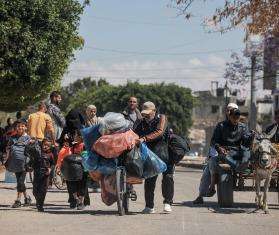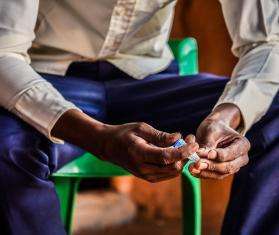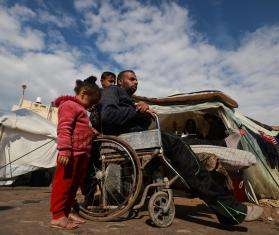Lebanon has been in a state of emergency since late 2019, beset by the COVID-19 pandemic, an economic crisis, and political and social upheaval. On August 4, 2020, a devastating explosion shook Beirut, killing more than 200 people and injuring thousands more. One year later, people are in increasing need of humanitarian aid. Half of Lebanon’s people live in extreme poverty, with many barely able to afford food or medicine.
Fawziyya Al-Sahili is one of them. She stands in her kitchen in northeastern Lebanon, stirring a vegetable stew. “My neighbors brought me this meal yesterday, otherwise we wouldn't have any fresh vegetables,” she says. “We haven't eaten meat for a year. With my son’s salary we can only afford bread, beans, and lentils. That's the way it is now.”

Fawziyya, 64, has high blood pressure and diabetes, and needs to eat a healthy diet with lots of fruits and vegetables—but they are often out of reach for her and her family. One of her sons works in a shop where he earns 10,000 Lebanese pounds each day–less than one US dollar at today’s informal exchange rate. Her other son is unemployed. The three of them live together in an unfinished house that they can’t afford to complete.
For the past two years, she has visited the Doctors Without Borders/Médecins Sans Frontières (MSF) clinic in the nearby town of Hermel for regular check-ups, and to collect the medications and insulin she needs.
After the explosion
Fawziyya and her family are among the 50 percent of Lebanese people now living in extreme poverty. Since 2019, this small country on the eastern coast of the Mediterranean has been hit hard by an economic crisis, rising inflation, political instability, and the COVID-19 pandemic. In this unstable climate, one of the largest non-nuclear explosions in history rocked the capital city of Beirut on August 4, 2020.
The huge explosion, centered in the Port of Beirut, had devastating effects: close to 200 people were killed, more than 6,000 were injured and tens of thousands lost their homes. It also destroyed many public facilities, including hospitals, and badly damaged the central warehouse of the health authority, disrupting access to medicines, especially for elderly people and patients with chronic diseases.

In the wake of the explosion, MSF teams donated first-aid kits to the Lebanese civil defense and medical supplies and masks to the Lebanese Red Cross. MSF teams in three locations–Karantina, Mar Mikhael, and Khandak El Ghamik–treated more than 1,800 patients with wounds caused by the blast, and 4,500 patients with chronic diseases who needed medical support that would otherwise have been interrupted.
MSF teams also went door-to-door in affected areas to assess people’s needs. They installed water tanks and distributed water purification and hygiene kits, and scaled up mental health support.
Medication in short supply
Even before the pandemic, the public health system faced regular bottlenecks for medications and medical supplies as a result of the economic crisis. During the pandemic the situation grew even worse. People injured in the explosion rushed to reach hospitals without taking protective measures, as coronavirus was the least of their worries. In the weeks following the explosion, several public hospitals were nearly overwhelmed by high numbers of patients with COVID-19. As cases spiked, Lebanon was put under lockdown for several weeks.
One year after the Beirut explosion, people’s need for medical and mental health care is still enormous. But a visit to the doctor has become a luxury for many due to the high cost of private health care. “The health system in Lebanon is highly privatized, so more and more people cannot afford medication or see a doctor,” says Hammoud al-Shall, MSF assistant project coordinator. “People have to decide whether to spend their money on food or drugs. The prices of both are up to five times what they used to be."
Fawziyya found it impossible to find even the most basic medications, like acetaminophen. “I fell and then I had such a headache,” she says. “I wanted to buy [acetaminophen], but the pharmacist didn't have it. We tried three other pharmacies, but it was nowhere to be found. The drug is no longer available in Lebanon.”
Medication shortages create challenges, even for organizations like MSF. It is difficult for local companies to import medications into the country, so MSF teams now import the most essential ones themselves. Lebanon’s escalating fuel crisis has increased transportation costs, impacting both medical supplies and patients trying to reach medical care.
An uncertain future
Many people in Lebanon—both Lebanese and refugees—already struggle with stress and psychological trauma connected with war or displacement. Now, deteriorating living conditions are proving an additional burden and impacting their mental health. Numerous patients who seek psychological help from MSF suffer from depression, anxiety, or despair.
Fawziyya worries about her family’s future. She’s particularly concerned about her son who is out of work. He also receives care at MSF’s clinic in Hermel, where he attends mental health consultations.
Her meal now ready, Fawziyya sits on the carpet with plates of rice, white bread, and vegetable stew in front of her. Her anxiety about the future is ever-present, but she has not lost all hope yet. There is solidarity amongst the Lebanese people, and she says she feels supported by her community–not just the neighbors who bring her food, but the social workers and doctors in MSF’s clinic where her family gets free medical and mental health care and medications they need.




